The L³ Alliance (Lifestyle, Legacy, and Leading by example) is the women’s group for the Wells International Foundation. Founder & CEO, Dr. Monique Y. Wells, believes it is important for high-achieving professional women to keep the idea of legacy “top of mind” and to observe how doing so influences their impact as leaders. She invites women leaders to reflect on this concept by contributing to the What Does Legacy Mean to You? article series.
Fueled by her personal passion and professional mission to help families build multi-generational legacies of success, Thomasina Williams is the founder of Sankofa Legacy Advisors. She was drawn to work with families when she learned about the “shirtsleeves-to-shirtsleeves-in-three-generations” phenomenon, which documents that 70 percent of families lose their wealth by the end of the third generation. Her work is devoted to helping families be as purposeful in cultivating their family relationships as they are in and growing and protecting their financial assets.
L³ Alliance: What does the word “legacy” mean to you?
TW: Many people think of “legacy” as simply the money or material possessions you leave behind after you die. For me, “legacy” has both a quantitative and a qualitative component, and is about the here and now.
I believe that the most precious asset you have is who you are, not what you own. And who you are is defined by your values, your character, how you treat others, and the way in which you walk in the world.
“Legacy” is the manifestation of who you are. It’s the imprint you make on others – on people, places, and institutions – that endures beyond your time.
L³ Alliance: How does it apply to you right now as a woman who is a leader in your field?
TW: I serve as a strategic thought partner, coach, and consultant to business-owning families who enjoy financial success. I help them build connected and capable families as part of their effort to sustain their wealth across generations.
Research shows that relationships drive the long-term sustainability of both a family’s wealth and its well-being. I help family members individually and as a family develop the courage, confidence, and skills to navigate the complex relationship dynamics that arise from combining family and finances.
The work supports family members to become the best version of themselves. It includes a focus on the intangible dimensions of wealth – such as human, intellectual, social, and spiritual capital – to help clients clarify who they are, who they aspire to be, and how to close the inevitable gap between the two. It’s very much about helping people be purposeful in living their lives and defining their legacies.

I refer to my work as “Legacy Family Planning” because, in my field, a “Legacy Family” is one that is able to preserve both its financial assets and its close family relationships for four or more generations.
Families are the bedrock of our societies, and family businesses are the cornerstone of our economies, accounting for 60 percent of GDP in the U.S. and 70 percent globally. I’m privileged to claim as a part of my own legacy helping families in business together to develop multi-generational legacies of success.
If I had to describe my personal legacy in one word, it would be “service.” It’s a core value that defines who I am and is a consistent theme throughout each of my three careers, first as a lawyer, then in institutional philanthropy, and now serving families. In addition to my work on behalf of families, my legacy is reflected in the lives I’ve impacted in a significant and positive way within my own family, among friends and colleagues, and across my community.
L³ Alliance: Describe the relationship between leadership and legacy.
TW: I believe that we are all leaders – or at least have the potential to be leaders in whatever sphere we operate. It’s just that most people haven’t tapped into their innate wisdom and leadership abilities. Unfortunately, in many societies, we’re taught to look outside ourselves for answers and for leadership.
To be an effective leader over the long term, you must first learn to lead yourself – which harkens back to knowing and (re)defining who you are. Who you are determines both your legacy and your leadership.
L³ Alliance: How can keeping legacy “top of mind” help you be a better leader?
TW: Keeping legacy “top of mind” can help you be a better leader by reminding you to strive always to be the best version of yourself. This requires that you be intentional about what you think, say, and do. When you strive to be the best version of who you are, you offer others inspiration, permission, and space to be the best version of who they are. Through your words and actions, you model what it means to lead.
We are all building a legacy – whether by default or by design. Remaining cognizant of that fact reminds you that you have a choice make.
To be the leader you aspire to be requires that you make the choice to be purposeful in how you live your life – and that you do so consistently.



